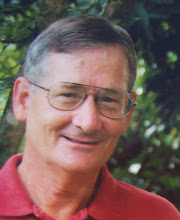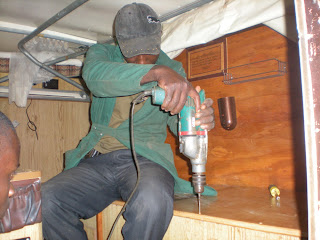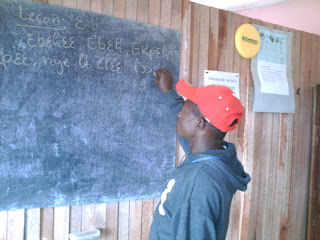We drove back from Somalomo today. The trip was 273 km, of which we were on pavement for 140 km. Somalomo has a district office. The government officer was very hospitable and interested in us and our reasons for working among the Badwe'e. I visited one morning in his office and today Mary and I visited with him in his home. He let us take pictures of everyone there. He was very encouraging and interested in the possibilities for extending our work farther, impacting the institutions there and all the people of the area. He was mainly thinking about the ways in which they could be more effective in their work through use of the mother tongue. The coordinates for the office, homes and palm oil plantation of our Badwe'e coworkers are Lat N3 deg. 23 min. 43 sec and Long. E 12 deg. 44 min. 34 sec. This is approximately equal to "3.395000, 12.743300". I did a google map search on this spot and only saw clouds over forest, nothing in detail. We
do experience a lot of cloud cover there, so it is not surprising to see that the satellite took a picture of fluffy white clouds from on high. We have a much better text of Genesis now. We are all excited by this step and are taking further ones. They are recording all 50 chapters and putting them on the Saber", a digital playback machine. We improved the wording of Genesis, too. Where Jacob is struggling with Laban, God rewards him by giving him spotted and striped sheep and goats. The word that our coworkers first gave us was
motɔn, which upon further investigation meant either “buttons (on clothing)” or “freckles”. The right word is
moba, which was new to me. This has the right meaning of spots in fur, not caused by dirt splashing up on otherwise clean fur. The spots are part of the natural coloring of the animal. This means that we have another word whose root is “b+a”. The other ones are:
bà “cut up” (tones: Low, Low)
ba “marry (when ego is male)” (tones: High, Low)
ba “cut off piece of bark” (tones: Low, High)
ba “spot” (tones: Low, High)
ba “two” (tones: high, high)
ba “split manioc, boiled) (tones: high, low) In addition, there are words that have “a” as the root and “b-” as a prefix of class 2:
ba “definite article (used when a relative clause intervenes between the head noun and the article)” (tone: high)
ba “these” (tones: high and low)
ba “them (object pronoun used when there is another object to the verb coming before it)” (tones: low and high) Confusing?
 The kind of discourse genre you are engaged in producing determines how many of the surface-structures of the discourse will appear. The high-level choices determine the low-level choices.
The kind of discourse genre you are engaged in producing determines how many of the surface-structures of the discourse will appear. The high-level choices determine the low-level choices.




















